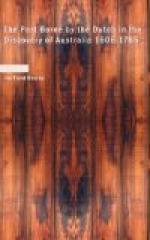Historians in Australia, unaware of this bit of linguistic inside information, have faithfully copied abbreviated names from 17th century documents and subsequent publications, often without the abbreviation point and as a result the family names such as Jansz, Jansen, Jantsen, etc. were widely used to indicate Australia’s first recorded European mariner. There seems to be an effort being made today by those in the know, including by people of the State Library of NSW, the Duyfken Replica Foundation, the VOC Historical Society, Australia on the Map 1606-2006, etc., to call the gentleman in question (Willem) Janszoon with two syllables including in writing. And it is catching on as it is not hard to understand how this ‘Jansz error’ crept into Australian history.
Some publishers of English historical literature when correctly presented by authors with text containing these patronymics with the abbreviation point added, have simply removed the points arguing that this ‘full stop’ in the middle of sentences is confusing for the English reader, thereby wrongly embedding the abbreviated name as the real one in the readers’ minds. This happened for example with the text of “Batavia’s Graveyard” according the Cambridge educated historian Mike Dash, its author. This is the more reason to write the full name in the first place.
The message therefore is simple: do not use abbreviated patronymics when writing, in English, about 16th and 17th century Dutchmen and nobody will be confused.



